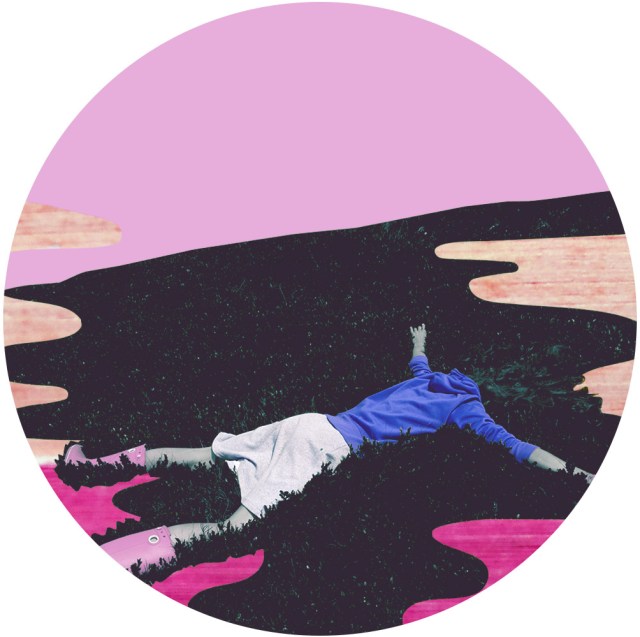
“Would you like a plastic bag for ten cents?”
The man stares at me like I’m insane.
“Ten cents for a plastic bag?” he asks incredulously. He is older, white, bearded. I’d believe he was a professor if it wasn’t so obvious that he’s not from around here.
“Yes, it’s a city ordinance to cut down on plastic bags.”
“That you benefit from! It’s profitable environmentalism!”
I inhale the thought: “Yes I am paid minimum wage at an independent bookstore, but every night I swim in the millions of dimes I have personally gained from this city policy.”
“I’m sorry sir, we didn’t make the policy.”
“Can I get a receipt or does that cost ten cents too? It didn’t read my credit card, do I need to pay a fee for that?”
I hold in my eye roll until he walks out the door, and then make eye contact with my coworker. We both make the “customers are terrible” face and, smiling, I go on my break.

Last year I quit my well-paying city job to go back to school and work in retail and my mother still hasn’t gotten over it. To her my decisions seem like symptoms of mental illness that plagued my grandmother and great grandmother. It’s hard to explain why I needed to leave the world of business casual clothing and passive aggressive emails to feel sane again.
I had been at my job a month when Donald Trump was elected president and I can still remember the anxiety I felt sitting in my office, alone, trying to look like I was working as panic was bubbling up inside of me. Even in the liberal city of Cambridge, MA there is a pressure on government employees to be unbiased, so even though I wanted to hide under my desk and cry, I would spend my day replying to emails and occasionally seeking out the other queer person in my department and sitting quietly with them. It took me a while to recognize my feelings of fear and hopelessness as the silently spreading depression to which I was so accustomed.

In my first week at the bookstore I realize that almost every other member of the staff is queer. The older man who has been here for twenty years, the twenty-two year old from Kentucky who graduated last year, the Smith alum who wears sweatpants and listens to D+D podcasts. Our token straight man tells me he has kissed two of his male friends and tells me he learns a lot from me when I talk about gender theory.

I’ve come to believe that depression destroys your sense of time. Days drag on and it seems impossible that you will last until the end of the week, but then the weekends fly by in seconds. It is the worst in February, the longest short month imaginable. In my mind February is shrouded in darkness, snow piling up on the sidewalks, and it’s all I can do to drag myself out of bed every morning, pull on the same sweater I wore the day before, and leave the house.
It is a February afternoon in 2017 when my boss sends me an email appointment for a meeting with her and our director of human resources. Great, I think to myself. I’m going to get fired.
I don’t get fired, but I do get an extended list of ways I have been failing at my job. I need to maintain the room schedule, I need to reply to emails faster, I need to dress better. There is no dress code in my workplace due to union policy but my winter sweaters are still not up to par. I want to cry but I work in events, and I can’t go home until 8pm. Instead I spend the afternoon wondering how much it would hurt if I bit off my finger. Would the emergency room nurses at the ER know what I had done? Could I tell them it was slammed in a door or bitten off by a wild animal? Would I have to go to the psych ward? If I was in the psych ward could I finally get some peace?
I start wearing dresses to work and try to cover my eye circles with makeup.

It’s June 2018 and a customer tells my token straight coworker that she would feel more comfortable asking him about literature if he wasn’t wearing a soccer jersey. We laugh hysterically when she leaves at the absurdity of the comment. Imagine thinking people only know about the topics written on their shirt. My coworker jokes “then she wouldn’t know anything.”

My director decides that we will plan a panel for the city to discuss how we go forward from the 2018 election. It is my job to coordinate the panel and a cocktail party for donors, something we have never done before. For weeks beforehand we have meetings and walkthroughs and technology tests. Until the very last minute I have new suggestions for how to arrange posters and set up the slideshow. All of the speakers are friends with our donors and the room is filled with predominantly older, wealthy, white heterosexual couples. In a meeting I suggest more diversity and I am told that we have a “diversity of professions.” Then I am told the quality of the microphones is unacceptable and sent on my way.

It is pride month and our book display is not my favorite. There are a few good biographies and of course “Call Me By Your Name” makes an appearance, but none of it feels like it’s something I would read. So, our queer booksellers come together to create a display of queer genre fiction and it is freaking incredible. There are mysteries by trans authors and children’s books with dragons and women falling in love while pulling heists. Our manager features the display on all our social media.
That same month a preteen comes in and asks us if we know any books with characters that use “they” pronouns and three of my coworkers have suggestions. Their mom comes up and thanks us afterwards for our enthusiastic response, and says “it’s so amazing to see you all dressed up in your pride gear!” It’s only then that I register that one coworker has rainbow hair, another is wearing a shirt that proudly shouts “boi!” and I’m repping Autostraddle with my “Gender Traitor” tank.

I feel crushed under the weight of professionalism. My therapist has referred me to a psychiatrist who has prescribed me Prozac which helps me keep my head above water. Being in my office makes me anxious and not being there makes me feel guilty. I think about leaving but feel that I would be giving up just because it’s hard.
Most digital job applications have a place where you can disclose if you have a disability, and under the list of conditions “major depression” is listed. I can never quite bring myself to check the “yes” box. Is it really that bad? Would I be claiming something that isn’t mine? How would a job provide accommodations when sometimes what I need is to just stay home and sleep.
In March I start reading The Queer Art of Failure by Jack Halberstam for what is probably the third time but this time it strikes something deep inside of me. Halberstam argues that how we define success is tied to heteronormativity and capitalism, and how failing to achieve can actually represent an avenue for potential revolution. Using Pixar, Halberstam makes analogies to the labor movement, the power of the collective, and the potential of disrupting linear timelines.
“What if” I think, “failing at this job can be a good thing.”
The next month I apply to grad school.

A man calls the bookstore looking for a book of art by John Singer Sargent. Our connection is bad and I ask him to spell the last name, unsure if I had heard correctly.
“I have to SPELL the name of the artist? For a bookstore employee?” he exclaims into the phone.
“I’m sorry sir, I just wanted to make sure. It doesn’t look like we have that book would you like me to order–” I stop talking at the sound of a slammed phone.

One of our regulars has the same name as my brother and I have to consciously remind myself not to call him by a collection of nicknames that other kids teased my brother with. Allie, Al-Pal. He is homeless and keeps his bag of belongings in our storage closet during the day. When he comes in to charge his phone sometimes we talk about how the influx of tech companies has rapidly changed our little city of Cambridge, making it harder to work and live in. He is from Scotland, like my dad, and he has travelled the country, picking up work where he can and getting really badass tattoos. He is polite and considerate, in opposition to some of the residents of nearby Harvard University, and many of the tourists who come to marvel at its grandeur.
Al is a person who has failed capitalism, or who capitalism has failed, but I am beginning to think that failure allows a person to remember their humanity.

I take out some loans and go back to school. I make minimum wage but for the first time in a long time I like my coworkers. I worry though, when money is tight or customers are rude that maybe I’ve made a mistake. Should I have stayed at my well paying government job? Would I be better set up for the rest of my life? Would it have been a better opportunity if I hadn’t given up, if I hadn’t failed?
One day I pass one of my old colleagues walking down the street. We catch up on news and she says “You look happy! One day I’ll be happy too…”
I think about my past year. I think about quitting my job and going back to school and moving apartments. I think about getting engaged to my girlfriend of four years and planning a future that maybe isn’t typical, but is perfect for us.
I think maybe failing is the best thing I’ve ever done. ![]()









Comments
Love all of this. Especially “I think maybe failing is the best thing I’ve ever done”. It feel that so hard right now.
Customers can be the worst. Keep up the good work!
They really can
I got a little emotional reading this. There is nothing more freeing than learning to accept your own failure. Rock on, you, and thank you for sharing your story!
Thanks so much Christi, I absolutely agree!
I love this so much; I feel this so much. And it’s so beautifully written!
My life recently curved off on an unexpected path that is some ways is a failure. I saw people from my old path this weekend who told me I was the happiest they’ve ever seen me.
Finding happiness in failure can be awesome.
And also, this article reminds me of this: https://deadspin.com/20-years-ago-this-week-michelle-kwan-did-not-win-olymp-1823173036
Thanks for your response! Fun fact- Michelle Kwan lives in my hometown now! Her mom befriended my best friend’s mom who owns the best Chinese restaurant.
This was great!!! Thanks for sharing.
This gave me chills. Thank you for writing it!!
I didn’t give up a good job, but I’ve been deliberately not pursuing good jobs in my field. Instead, I’ve stuck with two low-paying customer service jobs, where I have coworkers I adore, and which let me preserve all my mental energy for writing queer YA fiction. I probably ask myself once a week if I’m making the right decision, or if I’m dooming myself to future failure. But then, when I stop to take stock, I realise I’m happy. I have great coworkers, two fun jobs, a beautiful little apartment I can afford, time and energy to pursue my passion for writing, and the best girlfriend in the world. I don’t see how playing into the demands of capitalism instead could possibly improve things.
Absolutely!! There’s so much pressure to “achieve” within a capitalist framework that it’s hard to realize that the system is broken! I’ve found that to take care of my health I need to be able to take a step back from the idea of being successful and just figure out how to make the things I like work. Best of luck to you, I hope to read your queer ya fiction one day!
This is so real! It’s hard to disentangle ourselves from Capitalist notions of success and productivity. If we’re not striving to be appropriately productive, what are we even doing with our lives? *eye roll at everything* I love that you brought in Halberstam’s Pixar analysis–I find the “Finding Nemo” section in particular so tender.
I love and relate to this so much.
I’ve recently decided to make a career change and apply to grad school too, and I didn’t realize until making the decision how much the notion of “climbing the ladder” in my current career path was a weight on my shoulders, how little I could imagine my future in this world (which involves a lot of events & rich, straight, white donors too), how much I was just accepting a huge amount of existential dread as “normal” and just sort of what it was like to have a job. Since I’ve decided I’m quitting this job, even in the awful moments I feel such a sense of freedom. I’m sure that it’s not that simple, and I’ll have moments of existential dread in my new career to (capitalism! am I right), but for now I feel such a palpable sense of relief about taking myself out of the running for this one.
Thanks for articulating so much that I was thinking! I hope you’ll write more on this site.
Congrats on quitting!! Best of luck in all your endeavors.
This reminds me of a video about a guy who quit his government job to work at a supermarket. He just downsized to the extreme, even choosing to bike to wherever he needs to go and says he’s a lot happier precisely because he now has more time to devote to the things he actually wants to be doing.
Also, one of the best websites is The Customer is Not Always Right and if you join tumblr. one of the best pages is Petty Revenge. I ensure you that I’m an angel. ❤ ?
Or, assure, rather
I need to read exactly this, exactly today. Thank you for writing. I am definitely failing at my current job, and working to release myself from the shame I feel about that. So to think about this failure as maybe just a different pathway opening up before me…helps a lot.
Also, I couldn’t agree more with what you say about depression destroying your sense of time. Whew. Yes.
I’m struggling still with whether I am going to go all out applying for academic jobs or give up on that path. Some parts of being a scientist are what I have dreamed about since I was a little kid, but there’s so much about academia that I’m just like, ugh, do I really want to commit to zillion-hour weeks, constant sleep deprivation, not seeing my family or exercising enough, constant stress about trying to find grants, the famously awful “department politics” thing I suspect my awkward introverted self would get bulldozed in, blah blah blah just so that in seven years I can maybe be told I’m not good enough? I know we have some academics here…help, y’all!
Ack did I delete my first part? Let me try that again: Marnie, this was a great article, thank you so much for sharing. You are so right about “failures” maybe turning out to be good for us. Good luck with grad school, the bookstore sounds great.
I definitely feel you about whether or not to stay in academia. I truly hate the constant pressure to publish and find grants, but I also love being able to shift the idea of who “belongs” in academia. Since I’m a grad student in a computational field, I could also fairly easily switch into a tech job, which has its own host of problems. I have a few years left in my degree, so I still have time to figure it out, but right now, it’s looking like it’s boiling down to “where do I want to fight the system the most?” :/
“the idea of who “belongs” in academia”: @shui this is one of the things pulling me towards it. It super pisses me off that a lot of the strands in my life that have made this path hard are traceable directly or indirectly to misogyny, external/internalized biphobia, etc. There are, now, some openly LGBTQ people in my field and even in my subspecialty and that rocks, but there were none when I was in undergrad/master’s. I kinda wanna be that for the ones coming up, you know? I think I’d be a damn good student mentor. Also the questions I want to research, it would make a big difference to Real Live Actual People (patients and their families) if I could get some good answers and get ’em disseminated. Also I totally want an office with rainbow stickers and “safe space” signs and xkcd prints taped up everywhere and “It’s worse than that – it’s physics, Jim!” on a whiteboard. (https://www.youtube.com/watch?v=M1pzN3CgANE … if you dare :) )
“wanna be that for the ones coming up”: @iarrannme Yes! Exactly this! You sound like you’d be a fantastic mentor!! I worry about all the marginalized people who have self selected themselves out of academia because they didn’t see anyone like them, or had too many barriers in their way, or didn’t have anyone cheering them on. As a grad student, I’ve been trying to find ways to connect with undergrads (speaking on panels, TA’ing for classes, etc), but I have a limited reach compared with what faculty can do. I’d love to hear any suggestions :D
In my undergrad, I could count on one hand the number of out LGBTQ people in my field and still have fingers to spare. In fact, my undergrad research adviser is gay, but I had no idea until I happened to run in to him and his husband off campus after a full year of working with him because he never mentioned it and didn’t have any signs/stickers in his office. Luckily, in my grad program, we have a bunch of openly queer students and a few out faculty. I would have loved having an openly LGBTQ faculty member to go to when I was just starting to question my sexual orientation as an undergrad, and I would love to have an openly enby/trans mentor as I work through my gender identity now! Also, I’m not sure what field you’re in, but https://www.500queerscientists.com/ is a pretty dope resource for queer visibility in STEM!
@shui Yes, 500queerscientists makes me smile. And your efforts to be visible for undergrads are also making me smile! It would have blown my mind as an undergrad to have a TA be visibly “yeah I’m here and I’m queer and you can be too.” Mind you I was so closeted and shy I probably never would have said anything to you (more like smiled at you and then blushed and looked away and agonized for the rest of the semester over whether you thought I was flirting or brown-nosing and totally avoided talking to you), but your example would for sure have stuck in my mind and helped me later. So don’t underestimate what you are doing even if you don’t get a lot of overt feedback on its results.
Thank you so much for your response! I absolutely understand- academia is a mixed bag of having the joy of being able to research your interests and dealing with all the elitism and classism of universities. I hope you find the best balance for your life! That’s something I’m still working on.
Congratulations on a year of “failure”. Hopefully you’ll continue to “fail” in ever better ways going forward.
“I want to cry but I work in events, and I can’t go home until 8pm.” Story. Of. My. Life. ?
Me too. We need a ‘I work in events and want to cry all the time’ support group.
Absolutely. We can call it “everything would be fine if you could just CHILL”
And ‘suppress your feelings’. I’m sure that doesn’t set a person up for a world of therapy needs!
thank you for this, I voluntarily left a “good” job recently and am trying to figure it all out. This couldn’t be more timely.
I really, really enjoyed this. Also reminded me of awful customers of days gone by…
Well done for having the courage to do something different. And thanks for the book recommendation too!
Thank you for this! I was a high-achieving student throughout my entire academic career, and I found it impossible to adjust to my first “real job.” I cried at work a LOT. Now, I work many seasonal, hourly jobs (tour guide in the summer, college application essay editor in the fall, ACT/SAT tutor in the winter and spring) and I’m so much happier. My dad puts a lot of pressure on me to get another salaried, full-time job, and I sometimes feel anxious that I don’t have one… but this is what’s good for me now. I’m hoping to go to grad school in a couple years.
“It is the worst in February, the longest short month imaginable.”
I’m going to borrow this descriptor for my life. Yearly
What an uplifting read! Thank you :)
This was excellent and comforting to read, and I immediately went to the bookstore’s insta to look at the pride book recs. I’m dying to read a book about “women falling in love while pulling heists”!
I did not know that I needed to read this so badly. I didn’t know that be crying by the end.
This was so great! Thank you! Will definitely be looking up the Jack Halberstam book, that sounds like something I need in my life.
This article was published on the day I handed in my resignation to my “successful corporate career path” job because it’s been making me painfully unhappy.
Thank you for the reminder that I’m doing the right thing!
Really beautiful writing. Congrats on the “failure” and good luck with the rest of grad school!
Ran across this today, thought of this discussion: https://longreads.com/2018/08/14/on-not-being-able-to-read/ – by a Black woman who went to law school but decided against being a lawyer.
Among many good parts, my favorite: “What do you do, what are your options for agency, if you’ve realized you’re on the wrong track but are committed to staying on until the end of the line? Put another way: what do you do with the bad feelings that fuel your passage past a certain set of obstacles once you’ve renounced the goal that’s supposed to legitimize them?”
Wow, I loved that longreads. Thanks for sharing!
Ugh relatable.
Never have I been so grateful to be a low level hireling who is not required to interact with anyone since Cheetolini. I’ll never forget forging ahead trying to block out the sounds the Orange Inauguration and the people down the hall cheering with repetitive clerical-work trance that just wasn’t coming.
This is just beautiful
This hits me so hard. I have been in so many of those emotional and some of those physical places, friend. You are doing a damn fine job of being a human being.
Thanks for your words, which are so relatable I almost cried. I hope that your depression has been kind to you recently (and that you’ve continued being kind to yourself). The first challenge is pushing ourselves out of our comfort zones by doing something out of the box, like stepping down from a ladder when our peers seem to be climbing it. The second is having to regain your energy to then be able to justify it to people. All the best